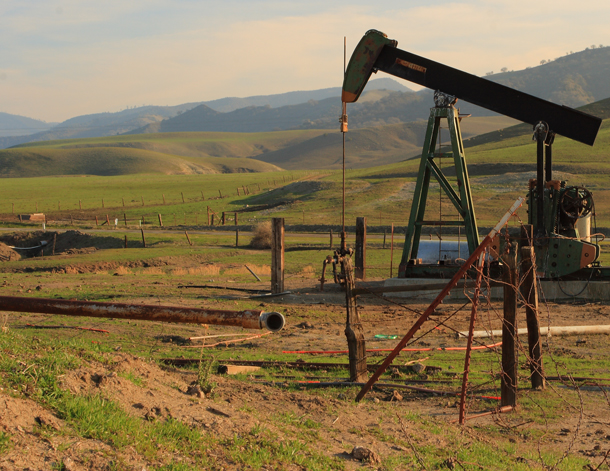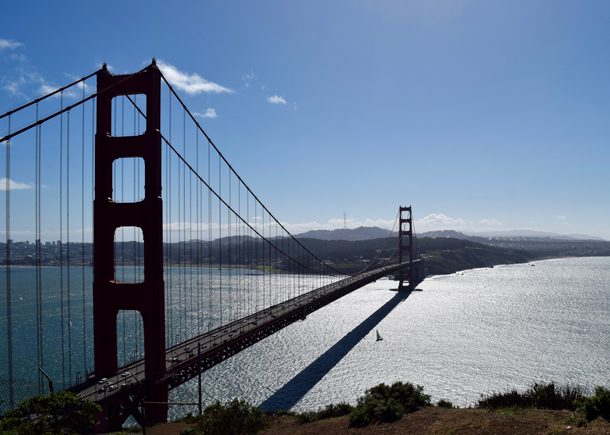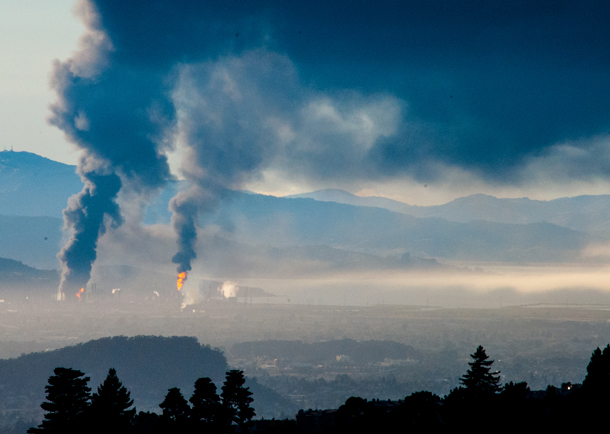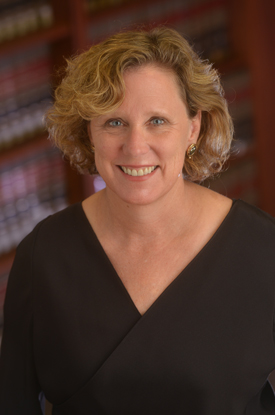Making Big Oil Companies Pay for Climate Disruption
Air Date: Week of April 13, 2018

Oil wells are common across Southern California, and San Diego County’s Imperial Beach has joined San Mateo County and Marin County in Northern California to seek compensation from big oil companies for damages caused by sea level rise. (Photo: Kari Bluff, Flickr CC BY-ND 2.0)
A growing list of US cities and counties are suing fossil fuel companies for damages linked to human-amplified climate change. Among the biggest defendants are Shell and Exxon Mobil, and emerging evidence suggests that they understood the warming effects of greenhouse gas emissions decades ago. Host Steve Curwood spoke with UCLA law professor, Ann Carlson, about the cases and what redress the plaintiffs are seeking.
Transcript
CURWOOD: From PRI, and the Jennifer and Ted Stanley Studios at the University of Massachusetts, Boston, this is Living on Earth. I’m Steve Curwood. Major fights over the fallout of climate change are heating up in state and federal courts in California. The odds are long, but a win by the municipalities could prove historic. San Francisco, Oakland, Santa Cruz, and other towns and some counties have filed several actions against Chevron, Shell, Exxon Mobil and other fossil fuel companies, claiming the use of their products raises sea level.
The plaintiffs want these companies to pay for some of the infrastructure that is needed to protect against floods. Exxon Mobil and some other defendants allegedly knew for decades about the damaging impacts of carbon fuel on climate stability. To learn more, we called UCLA Law School professor, Ann Carlson. Welcome to Living on Earth Ann!
CARLSON: Thank you. Nice to be here.
CURWOOD: So, why now? Why are these cities and counties moving forward with these lawsuits?
CARLSON: Well, there's several reasons I think the cities and counties are moving forward with suing oil companies for the damages they are beginning to incur from climate change.
First, I think the science that connects what the defendants did to what the cities and counties are experiencing in sea level rise and other harms from climate change is much stronger than it used to be. Scientists can really connect now the emissions that the defendants put into the atmosphere to harms like sea level rise.
Second, there's really good information that the defendants knew about the harms of climate change long ago, as early as the mid-1960s, planned their own business operations around rising seas and other harms from climate change, and yet engaged in a campaign to try to mislead the public about whether climate change was actually occurring, and that's really important from a liability perspective.
CURWOOD: Why is that?
CARLSON: That's because in California where the vast majority of these lawsuits have been filed, the suits are brought under a doctrine known as public nuisance. And the California courts have made clear that when defendants in nuisance litigation are engaged in campaigns to try to mislead consumers about the harms of their products or to try to persuade the government not to regulate those harms, that makes a difference for determining whether the defendants are going to be held responsible for what they did.

San Francisco is among the California cities suing big oil companies, including Exxon Mobil and Shell, for damages linked to climate change. (Photo: Savannah Christiansen)
CURWOOD: So, there are two lawsuits as I understand it. There's one in federal court and one in state court there in California and they are really saying pretty much the same thing. Why are they moving ahead in different arenas?
CARLSON: Well, there were a number of suits filed in a number of different California courts by different cities and counties in California, and the defendants in all of those lawsuits brought what's called a motion to remand to federal court. So, they would rather be in federal court than state court because California law is much more favorable to the plaintiffs in state court. There were two sets of lawyers and therefore two sets of remand motions to different judges. One judge decided that the cases should stay in federal court, and another judge decided that they should go back to state court, even though they're alleging pretty much the same thing.
CURWOOD: So, what are the likely arguments on each side of this case? I gather by now the oil companies aren't denying climate change exists, so what exactly is their defense?
CARLSON: The defendants’ principal argument against the plaintiffs is going to be that they pull the oil out of the ground, but they don't actually burn it. It's the burning of fossil fuels that creates the emissions that are warming the planet. Instead, they sell their products and then consumers combust the fuel when they drive cars or when they turn on the lights in the house, etcetera, and so I think they're going to try to argue that they're not the cause of the harm. They will have a bunch of other ways of trying to get the cases dismissed, but I think that's going to be their main argument.
CARLSON: So, how did that work for the tobacco companies that said that they only made the tobacco, it was the consumer that lit the cigarette?
CURWOOD: So, I think there are a lot of parallels between the tobacco litigation and the oil company litigation here. One is that the tobacco industry said they weren't causing harm, it was the consumers who were smoking the product causing the harm, and eventually, what the plaintiffs learned in those cases is that the tobacco companies were engaged in very extensive campaigns to try to get smokers to smoke, and not only that but to get them addicted to cigarettes through nicotine.
Similarly, here the oil companies clearly engage in big campaigns to get people to use their products and to persuade them that there's no harm. They engaged in a big campaign -- you may remember some of the advertisements that ran about how CO2 is actually good for the planet, about how there's scientific uncertainty about whether humans are causing climate change, all sorts of things funded by the oil industry. They even funded scientists to try to produce studies that cast doubt on whether climate change is occurring.
CURWOOD: All at the same time that they were planning their own construction and development based on things like rising sea levels.
CARLSON: That's correct. There's very good evidence that they were, for example, developing new technology so that they could begin to break through ice that was melting in the Arctic, that they were raising their oil platforms in anticipation of the fact that there was going to be sea level rise, knowing full well that the activities they were engaged in were going to be causing problems that then they were claiming weren't even occurring.
CURWOOD: So, let's say that the plaintiffs win some kind of a case here. What exactly would they win?
CARLSON: Well, they are seeking to have the defendants pay some of the costs of the damages that are already occurring from climate change and that will continue to occur in the future. So, one example is sea level rise. One of the things that's interesting about the science that we now have on sea level rise is that there is a pretty much linear correlation between increasing emissions and increasing sea level rise, and the defendants in a number of the cases, the plaintiffs have shown, contributed about 17.5 percent of that sea level rise through their emissions over the course of last 50 years. So, under these theories of how nuisance litigation works, a judge could say to the defendants, “You have to pay for 17.5 percent of the damages that cities are experiencing from the sea level rise that occurs around their city streets, that harms their city infrastructure and so forth”.
CURWOOD: Now, I note that the judge on the federal case, William Alsup, called for a five-hour climate science tutorial. Tell me what happened in that session and how unusual a move that was.
CARLSON: Well, Judge Alsup’s move was really unusual but he's done this in some other cases, not involving climate change but other subjects, where he uses his courtroom as an opportunity to learn about the problem that is involved in the litigation. And so he asked the plaintiffs and the defendants to come in and educate him about a number of important scientific components of climate change. What was really interesting about the hearing is that the defendant oil companies all admitted that humans caused climate change.

Chevron is among the list of defendants in the California cases. Above, the Chevron Richmond oil refinery in Richmond, CA, which caught fire in 2012, is located in the middle of the San Francisco Bay Area. (Photo: Stephen Schiller, Flickr CC BY-NC 2.0)
CURWOOD: Now, what effect do you think this will have on the on the case, that he did this tutorial?
CARLSON: Well, one thing that's interesting about the Judge Alsup case, that's the one in federal court, is that he made a very controversial decision to keep the case in federal court instead of sending it back to state court, and that's what the defendants wanted. But when he did that, he also made clear that he thinks that the case can probably go forward against the defendants. I think the defendants were trying to argue it should be in federal court, and the federal court should dismiss the case because the federal government's already regulating climate change emissions under the Clean Air Act and therefore we don't have a need for this kind of case. Judge Alsup in his ruling saying he was going to keep the case in federal court said, “No I think that this belongs in federal court and I think that's probably a claim that can go forward,” and then he held this hearing about climate science and another interesting thing that happened is that Chevron put on the scientific case and none of the other defendants said anything in court, and he wants all of them to also acknowledge that they believe that climate change is occurring.
CURWOOD: And in fact isn't this rather unusual that he is creating a record even before there is official discovery in this trial?
CARLSON: It's really interesting that he's holding this hearing. I don't know that it would be used as evidence once the case gets to trial, but it is a really important record to get the defendants right now saying up front, “We're not going to argue about whether climate change is occurring. We agree that it's occurring and we agree that we are that humans are helping to cause it”. Now, we're going to move on to the next question, which is what is the defendant's responsibility for the harm, not whether the harm is actually occurring.

Ann Carlson is the Shirley Shapiro Professor of Environmental Law at UCLA. (Photo: courtesy of UCLA)
CURWOOD: So, professor, I gather that Judge Alsup also asked for information about the experts that the oil companies put forward, in particularly, asked them to reveal their funding sources. Why did he do that and what did it reveal?
CARLSON: Well, I think Judge Alsup was interested in knowing whether the scientists that were testifying in front of him were credible. So, he wanted to know are there any reasons that they might be giving evidence to me that is skewed because, for example, they're getting money from the oil companies, they're getting money from the defendants. The result was that he found out that some of those experts had received funding in the past, but all of them were testifying at present in front of him without getting compensation from the oil companies.
CURWOOD: But some had done fairly well by the companies in the past it sounds like.
CARLSON: Yes, some of the witnesses had received funding from the oil companies in the past.
CURWOOD: Now, how is the emerging knowledge that companies including Exxon Mobil knew about human-caused climate change for years, how important is that in terms of moving these cases forward.
CARLSON: I think the evidence that Exxon and the oil industry more generally knew about climate change, changed their business plans as a result and then engaged in a campaign to dissuade the American public that climate change was happening and to try to persuade regulators not to regulate greenhouse gas emissions is key to the cases. I think it's really, really important. There's no way you can look at some of the internal documents that have already been uncovered from Exxon and the American Petroleum Institute and not think that their behavior was really, really problematic, and I think that's really going to matter in these cases.
CURWOOD: What do you suppose would have happened if instead of Exxon Mobil back in 1960 something or another had started to take action in favor of dealing with - with human-caused climate change? What kind of shape do you think we'd be in today?
CARLSON: If the oil companies had taken responsibility for the harms their products caused starting 50 years ago, we would see significantly fewer emissions in the atmosphere. I think we'd see a shift in how we use fossil fuels, maybe we'd figure out how to sequester the emissions that come from combusting fossil fuels or see a move toward cleaner fuels. If all that happened we would have far fewer emissions in the atmosphere and really importantly it would be cheaper and easier to get on a trajectory of emissions reductions that is going to be necessary to keep us at safe levels over the course of the next, you know, three to ten decades.
CURWOOD: Ann Carlson is the Shapiro Professor of Environmental Law at UCLA. Ann, thanks so much for taking the time with us today.
CARLSON: You're welcome, Steve. Good to be with you.
CURWOOD: When the suits were filed in 2017 Chevron spokeswoman Melissa Richie told the press: “Chevron welcomes serious attempts to address the issue of climate change, but these suits do not do that. Reducing greenhouse gas emissions is a global issue that requires global engagement and action.”
Links
Living on Earth wants to hear from you!
Living on Earth
62 Calef Highway, Suite 212
Lee, NH 03861
Telephone: 617-287-4121
E-mail: comments@loe.org
Newsletter [Click here]
Donate to Living on Earth!
Living on Earth is an independent media program and relies entirely on contributions from listeners and institutions supporting public service. Please donate now to preserve an independent environmental voice.
NewsletterLiving on Earth offers a weekly delivery of the show's rundown to your mailbox. Sign up for our newsletter today!
 Sailors For The Sea: Be the change you want to sea.
Sailors For The Sea: Be the change you want to sea.
 The Grantham Foundation for the Protection of the Environment: Committed to protecting and improving the health of the global environment.
The Grantham Foundation for the Protection of the Environment: Committed to protecting and improving the health of the global environment.
 Contribute to Living on Earth and receive, as our gift to you, an archival print of one of Mark Seth Lender's extraordinary wildlife photographs. Follow the link to see Mark's current collection of photographs.
Contribute to Living on Earth and receive, as our gift to you, an archival print of one of Mark Seth Lender's extraordinary wildlife photographs. Follow the link to see Mark's current collection of photographs.
 Buy a signed copy of Mark Seth Lender's book Smeagull the Seagull & support Living on Earth
Buy a signed copy of Mark Seth Lender's book Smeagull the Seagull & support Living on Earth

